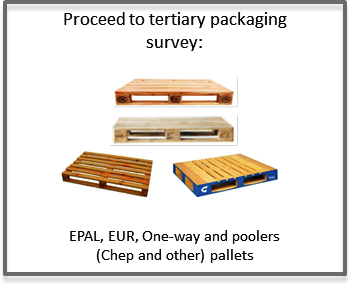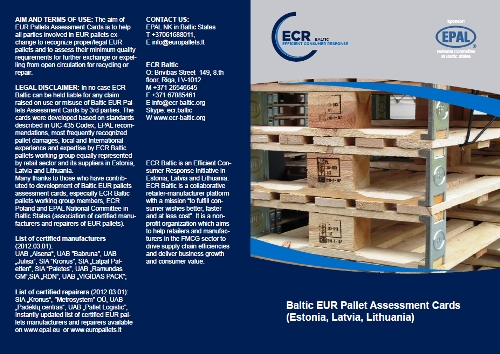
|
|
NEW:
Draft v3.0 ECR Baltic Pallets Assessment Card (with single brand EUR and EPAL pallets)
Download v1.0 and v 2.1 Pallets Assessment Cards, here: http://www.ecr-baltic.org/eurpallets
Poll for the meeting in April, 2015, here: https://ecrbaltic.doodle.com/tdxerademycqgr7f
* * *
Please help us to identify pallets exchange issues by filling out survey:
Survey link: http://survey.mailigen.com/?u=b86e8d03fe992d1b0e19656875ee557c&id=491d3ee3
Want to check questions or consult with colleagues, view questions offline: Survey__ECR_Baltic_survey_on_pallets_management_and_standardization.pdf
* * *
ECR Baltic EUR/EPAL Pallets Assessment working group meeting is set to Wed 7th of May from 11:00 - 14:00 at ECR Baltic office, Brivibas 149. Riga.
About working group: http://www.ecr-baltic.org/en/working-groups/pallets-quality-assessment-working-group/
Subscribe to the working group: http://mlgn.to/14x
According to decision from March 2013 ECR Baltic shall move to one EUR pallet assessment card to be supported in Baltics by ECR Baltic and revise it according to the new types of pallets entering the market, which is single brand: EPAL/EPAL and EUR/UIC
Preliminary agenda:
* Feedback from pallet training with ECR Poland (assessing pallet quality the same way)
* ECR Baltic Pallets Assessment Cards, adding new types of single brand EPAL and EUR pallets
* Merging Baltic pallets assessment cards v1 with Latvian temporary v21 to support only one by ECR Baltic!
* Top of mind issues: root cause abrasion rate 10% +
Assessment cards: http://www.ecr-baltic.org/eurpallets
Learn more:
Edgars Pentjuss
+37126546645
edgars@ecr-baltic.org
=============================
EPAL press release about extraordinary meeting of the UIC working group "Questions of palletisation" on the 17.06.2013 (on transformation from one EUR pallet system to two EUR/UIC and EPAL/EPAL). Read more: EPAL_press_release_uic_eur_epal_epal_exchange.pdf
=============================
v2.1 ECR Baltic EUR pallets assessment cards for Latvian market:
The new (lightened) version 2.1 of ECR Baltic EUR Pallet assessment cards were developed in response to and aligned with Latvian Food Manufacturers Federation (LPUF) and Latvian Food Retailers Association (LPTA) requirements. The v2.1 is a temporary version (to be reviewed or merged with v1.0 by March 2014) of ECR Baltic EUR Pallets Assessment Cards for Latvian market.
v2.1 available for for download, here!
More information: Edgars Pentjuss (+37126546645)
=============================
v 1.0 ECR Baltic EUR Pallets Assessment Cards available for download in
English | Russian | Lithuanian | Latvian | Estonian
Hard copies available for purchase, here!
==================
Pallets Cost Calculation template by ECR Poland
Chep Pallets workshop presentation
==================
EUR Pallets Legal Aspects presentation: 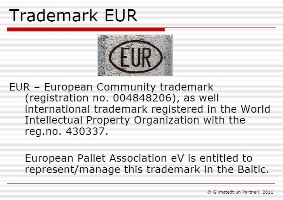
For mor information, please contact: Edgars Pentjuss +371 26546645 or mailto info@ecr-baltic.org
==================
General rules for handling and storage pallets:
Warehousing
Exposure to sun and rain worsens general pallet’s condition
Shutten rooms with humidity and without ventilation - suitable for fungus
The best place to store the pallet is respectively large shed
Pallets Killers Video by Chep/ECR Europe (Download full 197 MB Video, here: http://failiem.lv/u/xgknksp ).
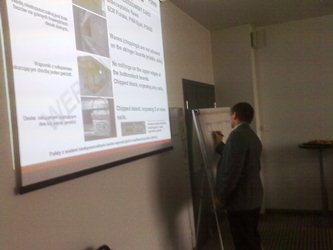
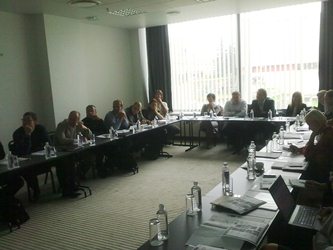
About ECR Baltic EUR Pallets Assessment working group (Baltic and Latvian subgoup).
Join pallets standardization working group, here: http://mlgn.to/14x
Registered working group members:
| Manufacturers/Suppliers/Distributors: Jurgita Grebliauskiene, Coca-Cola Hellenic Baltic Jevgeni Rudkovski, Coca-Cola Hellenic Baltic Egidijus Skarelis, Coca-Cola HBC Lietuva Kaspars Davids, Aldaris Vaiva Najute, Svyturys-Utenos alus Kristo Sussen, Saku Brewery Ltd Paulis Dalbergs, Royal Unibrew Māris Rodins, Fazer maiznīcas Nerijus Balandis, Kraft Foods Lietuva Evaldas Ciukas, Kraft Foods Lietuva Sergejus Radionovas, Eugesta UAB Andrius Jurgelevičius, Baltic Logistic Solutions |
Retailers: |
|
Others (Industry Associations & Solution Providers): |
For more information, please contact: Edgars Pentjuss +371 26546645 or mailto info@ecr-baltic.org

